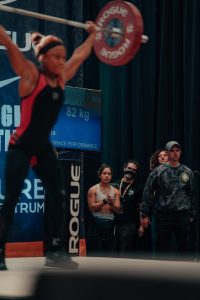I’ve been coaching in some form or fashion since I was 18 years old. However, about a decade ago, I started coaching athletes at a more competitive level in places that included high stakes and high stress.
Those competitions a decade ago included stages like the USAW National Championships, or the CrossFit Games or state championship high school baseball. It was in those competitions that coaching began to take on a different form for me. For a lot of my life I had thought of the coach/athlete relationship as very transactional. I’m not sure why I thought it had to be that way. Almost all of my coaches were very relational and the reason I got into coaching was because of that relational connection. I think I just saw some of the best coaches in the world in varying different sports as very hard nosed and hard lined. Not very friendly. I saw them as coaches who demanded a lot of their athletes, but I didn’t see the relational side in the locker room. I just assumed that to be a great coach there had to be a separation that was very defined and black and white between athlete and coach.
What I began to realize on some of those high stress stages, and in high stakes situations that coaching transactionally is a fast paced sprint to burn out. The type of athlete-coach relationship where an athlete “hires me“ to give them a product and help them produce a result and then moves on to the next task didn’t carry enough weight or enough meaning to keep me invested long-term. I recognize that the athlete coach relationship has to look different based on the sport, the setting, or the age gap; however, I also realized in those first few years that transactional coaching wasn’t something I was good at or something I wanted to do long-term.
The flip-side of the a transactional relationship is an athlete coach relationship that is transformational. This type of relationship centers far more around the journey and the process of the coach and athlete together. This type of relationship takes time and trust and patience, but it ultimately forms the foundation a friendship where I’m much more willing to sacrifice of myself and my time, for their greater good. And I KNOW athletes who have a transformational relationship with their coach are much more willing to trust, believe in, and sacrifice of themselves for their coach. The distinction between these two types of relationships is extremely important in the coaching world.
For me, transformational coaching is the only way that I am able to work with an athlete for an extended period of time and feel at all intimately invested in their growth, development, and performance for the extent of their career. The day-to-day foundation of coaching for me has to be relationship driven. I found this out the hard way early on as I tried to be a hard nosed, emotionless coach- the type coach that I read about in a lot of books or watching during sporting events. Trying to be that coach was not only against my nature, but ultimately led me to a place where I found myself less desiring to go to those events and less desiring to do the hard work of daily coaching and training.
Transformational coach-athlete relationships though aren’t always natural for the athlete. Most often, it takes years for the athlete to trust their coach in a way where they would allow that type of relationship to flourish. This is also part of the coaching process. Being willing to invest long-term in an athlete, not just in their sets and reps or technical inefficiencies, but in the relationship between the athlete and the coach. That work, though very much a challenge, is the foundation for a long-term relationship that is sustainable through hardship and able to persevere when everything isn’t so easy. It also makes that relationship a lifelong relationship rather than just a contractual obligation between two people for a specific goal.
The athlete coach relationship is more than just doing my “job”. The very foundation must be centered on relationship, trust, and friendship in some regard. Coaching is hard. It’s monotonous and can wear on you when you do the same type thing day in and day out. Without the relationships and the care and concern for each other’s life outside the gym, coaches will find themselves burnt out and bitter. At least that is what I find to be true for me.
It’s an obvious truth that forming these types of relationships take time, are never created the same for every athlete and comes with a lion’s share of its own challenges BUT the people we create these relationships with are worth more than any podium, medal, or performance could ever be worth. AND these relationships will always outlive the emotions of a great career.
Be Strong!
– Spencer
1 Chronicles 19:13



